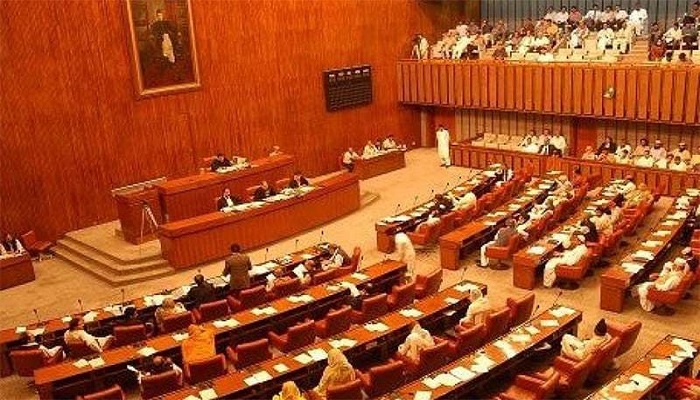 |
| An inside view of the Senate hall. — APP/ File |
The Senate on Thursday passed the Supreme Court (Practice and Procedure) Bill, which curbs the powers of the Supreme Court, amid objections from the opposition. The bill was passed by the Senate after it was approved by the National Assembly a day earlier.
The bill was referred to the Senate Committee on Law and Justice before a final vote on the bill, but it was rejected. A proposal was then made for quick approval of the bill, which was passed by the majority of lawmakers.
Opposition leader Dr Shahzad Waseem has condemned the bill, saying the government cannot ensure the distribution of grain and plans to frame the Supreme Court's rules. Waseem, adding that the standing committee has the right to appeal even in previous cases.
As the opposition leader spoke, PTI senators staged a demonstration at the top building.
When given an opportunity to speak, PTI Senator Ali Zafar said he had two objections to the bill.
"Only the constitution can be changed in 184/3. If you approve the laws in this way, they will be destroyed in 15 days," said the Senator. He said, the right to complain can only be granted through the Constitution.
Zafar said that the Standing Committee of the Senate has submitted a constitutional amendment on the right of appeal. He also warned that thousands of cases will have to be repeated when the Supreme Court reopens the previous cases.
The senator also objected to the timing of the bill when the Supreme Court suo motu election was postponed.
The NA passed legislation to block the suo motu powers of the CJP
A day earlier, in an effort to strengthen checks and balances in the high court, the National Assembly passed the Supreme Court of Pakistan (Practice and Procedure) Bill, 2023, which was introduced to limit the jurisdiction of the Chief Justice of Pakistan. Motu notice.
The bill was passed hours after it was cleared by the National Assembly's Standing Committee on Law and Justice.
The bill was introduced after two Supreme Court judges - Justice Syed Mansoor Ali Shah and Justice Jamal Khan Mandokhail - raised questions over the powers of the Chief Justice a man, the chief judge.
ACCOUNT
The bill envisages giving a committee of three members of senior judges with the power to receive suo motu notice from the Chief Justice.
In addition, the draft law includes a clause on the right to challenge the decision, which can be presented within 30 days and discussed within two weeks.
According to the bill, seen by Geo News, every article, appeal or issue before the Supreme Court must be heard and heard by a bench made up of the CJP and a committee made up of two senior judges. . .
The bill also states that the committee makes decisions by majority vote.
It is also noted in the Act that all matters related to the implementation of the original power in Article 184(3) of the Constitution will be referred to in Article 2 of the Committee and if the Committee believes that it is of public importance. . With reference to the implementation of fundamental rights granted by Title I Article II of the Constitution, a panel of at least three judges of the Supreme Court may also include members of the committee to deal with the matter.
Meanwhile, in matters involving the interpretation of a constitutional provision, the committee constitutes a panel of at least five judges of the Supreme Court.
The bill also gives a party the right to appoint a lawyer of its choice to file an application for review under Article 188 of the Constitution. For this purpose, it should be noted that the defense attorney is an advocate of the Supreme Court.



0 Comments